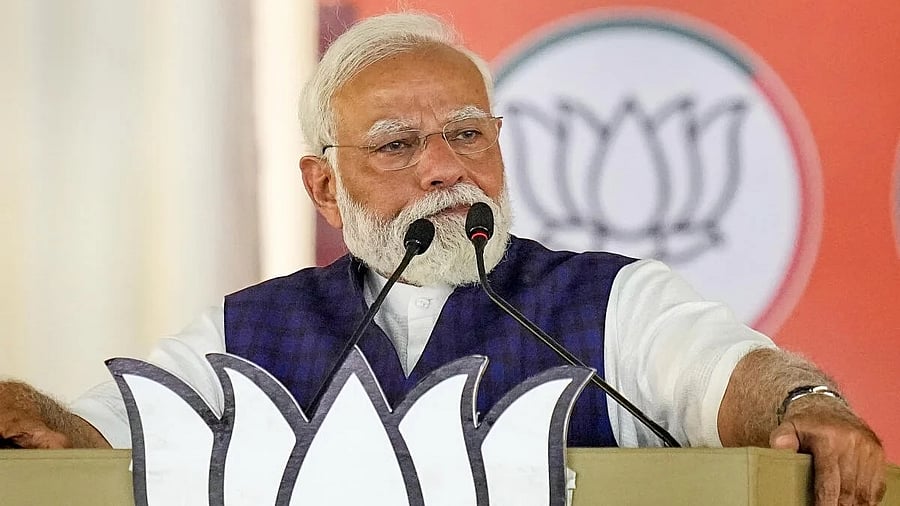
PM Modi
Credit: PTI Photo
India’s foreign policy is caught between multilateralism and bilateralism. This is a new contradiction. It was never like this before in the 78 years since Independence.
It was always a combination of multilateralism and bilateralism, with plurilateral approaches added between the two in recent years with a changing global landscape. Now it is one or the other, although the government’s spin doctors would have us believe otherwise.
Prime Minister Narendra Modi has made a big error of judgement in skipping the ‘high-level week’ in New York on the 80th anniversary of the United Nations, observances of which are ongoing. India wants to be a permanent member of the UN Security Council (UNSC). It is impossible to achieve this if its head of government stays away from the most important meetings of this year, which are taking place at the world’s high table as this article is being written.
This is not a reflection on External Affairs Minister S Jaishankar, who is leading the Indian delegation to the 80th session of the UN General Assembly (UNGA). Jaishankar is not S M Krishna, who read the Portuguese foreign minister’s speech in the UNGA instead of his own address, mistakenly assuming it was his speech. The Portuguese text was lying on top of his papers. Krishna just picked it up and began reading it because he was seeing any text for the first time since those are written by his civil servants.
In 1979, Shyam Nandan Mishra, who was External Affairs Minister in the Charan Singh Cabinet, wanted to deliver a speech in the UNGA, which he had written. Brajesh Mishra, who was then Permanent Representative to the UN, firmly told the minister to either read the speech given to him by officials or he would be pulled off the list of speakers in the UNGA. The permanent representative dared to do this to the minister because the Charan Singh government was already tottering and its writ did not run anywhere on anything. Indira Gandhi was about to storm back to power. An external affairs minister, who was of no consequence, meekly complied.
Notwithstanding Jaishankar’s experience and expertise in his long diplomatic career, he is not the prime minister. For that reason, according to long-standing UN protocol, his speech has been relegated, as of now, to September 27. By that time, almost all the kings, presidents, and prime ministers who flocked to New York for the UN’s landmark 80th anniversary would have left the city. If at all, only low-rung diplomats of countries, mostly attached to their permanent missions to the UN, will be in the General Assembly Hall to watch and hear the Indian statement. This constitutes a severe setback to India’s multilateral role, more specifically to its UN ambitions at a critical juncture.
By any yardstick, India has a difficult year ahead in the UNGA for the remainder of this year, and in the first three quarters of 2026 till the 80th session ends. The new president of the UNGA from this month is Annalena Baerbock, Germany’s Minister for Foreign Affairs until May. Three years ago, she stood alongside Pakistan’s then foreign minister, Bilawal Bhutto, in Islamabad and called for UN intervention in resolving the Kashmir dispute and in ensuring human rights in the Union Territory. India long ago jettisoned UN resolutions on Kashmir. These resolutions are as good as dead after India and Pakistan agreed in Shimla in 1972 to settle their disputes bilaterally.
During the campaign to get herself elected as UNGA president, Baerbock has not returned to the issue. That does not mean her views have changed. It is simply that she wanted to avoid divisive issues, and ensure that her election was smooth. She has not visited India during the campaign or after her election on June 2. This is a break from convention. With one exception in recent years, all her predecessors have visited India while campaigning or as president-elect. Baerbock’s decision to skip New Delhi is ominous, which was one more reason for Modi to have been present in New York this week. It would have been a shot in the arm for India’s role in the UNGA.
On September 5, India’s Permanent Representative to the UN, P Harish told the UNGA, which adopted by consensus a resolution on ‘revitalisation’ of the UNGA that “reform is key to improving UN’s efficacy, legitimacy and ability to deliver.” Euphemisms for India’s bid for a permanent seat in the UNSC.
In 2021, during the UNGA presidency of Turkey’s Volkan Bozkir, decades of patient work towards UN reform were undone on behalf of Pakistan-led ‘Uniting for Consensus (UfC)’ group which opposes the expansion of permanent seats in the UNSC. India must be more than simply ‘vigilant’ to ensure that Baerbock does not become another Bozkir in her new office. India must be multilaterally more proactive.
K P Nayar has extensively covered West Asia and reported from Washington as a foreign correspondent for 15 years.
(Disclaimer: The views expressed above are the author's own. They do not necessarily reflect the views of DH.)